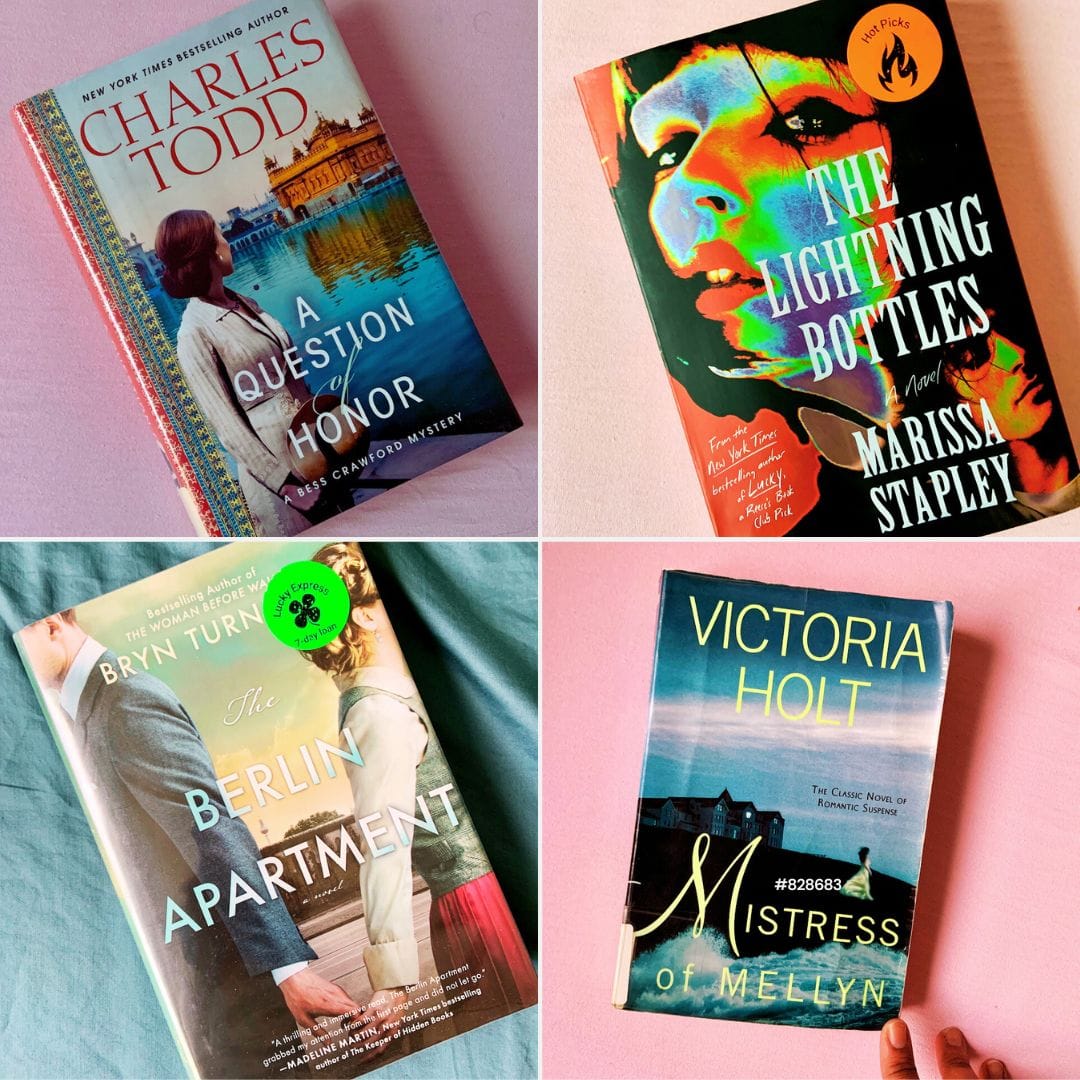May Mischief: Monthly Missives from The Dream Pedlar
Delving into springtime stories, writing milestones, and short fantasy reads in this month's rendezvous

We're in the midst of such glorious spring weather here in Burlington, Ontario.
The lake waters shimmer and sparkle, reflecting the gorgeous blue that the sky has come to don. It's gently warm in the sun, but the breeze is still cool and reminiscent of winter at times. New leaves abound, their greenness bright and fresh.
Then there's a succession of days when the sky is grey and it rains endlessly, reminiscent of monsoons in Mumbai. It feels like a cleansing.
The transition from winter to summer has been far too swift in recent years. So the persistence of spring this season is refreshing and allows for long moments of indulgence.
Like the season, this month's newsletter comes bearing many gifts. So read on!
Firstly, my short story Memory Games is FREE from May 25—29, thanks to a fantasy short story promo by the IASFA. It's also part of my six-story collection, Your Mother's Nightmares, which is just 99c until May 29.
Check out other books in the promotion here!
If you haven't yet read A Benevolent Goddess, you can grab it as part of an ongoing promotion over at BookFunnel: Beyond Human: Non-Human Characters in Fantasy and Science Fiction.

While you're there, you can also check out interesting books from many other authors. I'm currently engrossed in reading The Fall Of the Queen of Elphame, a Scottish folktale reimagined by Natalie Guttormsson.
On Writing
I've finally written 'The End' on Book 1 of the fantasy duology I've been working on. As many of you know, Book 1.5 is also completed and ready, delving into the story of a secondary character from Book 1.
But I'm holding off on publishing these titles for the time being, at least until I've made enough progress on Book 2.
Looking up my notes, I see that I began Book 1 in April 2022 — three years ago! It's been a stop-start journey as I struggled to figure out not only where the story was headed but also my writing process and life in general.
Now, Book 2 is underway, and it’s already twisting in ways I didn’t expect. The momentum’s good, the rhythm steady — but I’ve learned not to predict timelines. It takes as long as it takes.
In the coming months, I may seek your help if you're interested in reading an advanced copy pre-publication to share an honest review and help spread the word in general.
I'm a noob at this, so there's a bunch of stuff for me to figure out before I can set this up correctly. When I do, you will be the first to hear about it. That goes without saying!
Tales For Dreamers
This month's collection is like a potpourri.
'bleeding hearts' is a story of lovers and a witch who meddles in their affairs. 'destinations wrongly numbered' and 'a doorway of locks' are about places you wish you could go to but likely wouldn't.
And 'unusual offerings for unusual gods' is exactly as the title says. I sometimes wonder if it's true that the gods who confer the most blessings upon you are also the ones that demand the most sacrifices from you. What do you think?
Read this month's collection of Tales For Dreamers!

Life, Unadulterated
Have you ever heard the term 'hypernormalization'?
I only found out about it a couple of days ago. It's a word used to express the sheer dissonance between the undeniable brokenness of the world around us and the contrastingly humdrum way in which our daily lives are chugging along.
It was a recent article in The Guardian that drew my attention to this word, and nothing has served as greater validation for the realities of this madcap world we're living in.
First articulated in 2005 by scholar Alexei Yurchak to describe the civilian experience in Soviet Russia, hypernormalization describes life in a society where two main things are happening.
The first is people seeing that governing systems and institutions are broken. And the second is that, for reasons including a lack of effective leadership and an inability to imagine how to disrupt the status quo, people carry on with their lives as normal despite systemic dysfunction – give or take a heavy load of fear, dread, denial and dissociation.
~ from 'Systems are crumbling - but daily life continues. The dissonance is real.' by Adrienne Matei in The Guardian, 22 May 2025
More and more I've been feeling as if the world I'm reading about is vastly different than the one I'm showing up to in my daily life.
As if the small actions I take on a daily basis — waking up, caring for a growing child, writing, making plans for the summer — are completely out of touch with and irrelevant to the destruction and deaths and disruption I read about in the news day after day after day.
The article goes on to say that:
Hypernormalization captures this juxtaposition of the dysfunctional and mundane.
It’s “the visceral sense of waking up in an alternate timeline with a deep, bodily knowing that something isn’t right – but having no clear idea how to fix it”, Harfoush tells me. “It’s reading an article about childhood hunger and genocide, only to scroll down to a carefree listicle highlighting the best-dressed celebrities or a whimsical quiz about: ‘What Pop-Tart are you?’”
...
When we feel powerless in the face of bigger problems, we “turn to the only thing that we do have the power over, to try and change for the better”, says Curtis – meaning, typically, ourselves. Anxiety and fear can trap us, leading us to spend more time trying to feel better in small, personal ways, like entertainment and self-care, and less time on activism and community engagement.
~ The Guardian
Guilty as charged! Nothing is more enticing to me than a day spent in bed, reading or watching something on Prime Video (which has proven far superior to Netflix when it comes to interesting, Indian-origin movies).
It's almost as if I need this decompression to ensure I'm functional and kind and patient by the time I have to head out for the school pick-up run.
What makes dysfunction so dangerous is that we might simply learn to live with it. But understanding hypernormalization gives us language – and permission – to recognize when systems are failing, and clarifies the risk of not taking action when we can.
In 2014, Ursula Le Guin accepted the National Book Foundation’s Medal for Distinguished Contribution to American Letters, saying: “We live in capitalism. Its power seems inescapable. So did the divine right of kings. Any human power can be resisted and changed by human beings. Resistance and change often begin in art, and very often in our art, the art of words.”
~ The Guardian
Books have been the greatest and most reliable source of comfort for me in difficult times. Not friendship. Not therapy. Not travel. But the silent companionship of an absorbing story has always served as a balm.
Words really have the power to heal, to give us courage and empathy, and to make us think differently and choose to act differently.
After I finished writing Book 1 of my ongoing fantasy series, I found myself turning to writing personal reflections over on the website. Tagged 'field notes from liminal spaces', I've been posting these on Sunday evenings to serve as quiet thoughts and reflections for the week ahead.
There's a tender post on motherhood — the one thing I'd go back and change in my motherhood journey if I could — ( I had an excellent Mother's Day celebration with KrA and little D; there was yummy cake involved).
And another musing on parental guilt and childhood memories — what do you choose to remember? — is scheduled to go live later this evening but you can preview it already. (Subscriber privileges!)
But if time permits you to read only one long essay, let me point you to the one I wrote on the profound sense of longing and displacement we experience when our cultural identity is fragmented across different places, leading to a feeling of not fully belonging anywhere.

Books You May Love
I was slipping into a reading slump, so I first turned to my favourite author, Charles Todd.
A Question Of Honour is an especially interesting mystery featuring Bess Crawford, an English nurse serving in World War I. Crawford has spent part of her childhood in India, and this particular book is a deeply empathetic one, weaving India and England into a poignant narrative.
Then I read something delightfully unusual. The Lightning Bottles by Marissa Stapley is a love story that unfolds against the backdrop of the 90s alt-rock music scene set in Ontario, Seattle and Los Angeles, alternating with a present-day mystery set in Berlin and Iceland, aimed at resolving the disappearance of the lead singer of the band after which the book is named.
It's such a sweet nostalgic love story, deeply poignant and touching as we navigate the couple's relationship as it unravels under the strain of fame and drug use.

Incidentally, I went on to read another story set in Berlin. The Berlin Apartment by Bryn Turnbull is a thrilling love story that follows two lovers who are separated when the Berlin Wall goes up in 1961 and their daring attempts to reunite by digging a tunnel underground.
And finally, I read The Mistress of Mellyn by Victoria Holt, a Gothic romance novel that entails a new governess in a remote mansion haunted by the mystery surrounding the suspicious death of her employer's wife. Such a fun read and an absolute escape from the modern world!
Another month and another missive are nearing their end, dear Dreamer! Next month, we'll be halfway through the year — and I'd have a newly 9-year-old at home. No doubt I'll have thoughts to share about that!
In the meantime, if you too have been feeling adrift in the world lately, I hope you find words — whether mine or anyone else's — that enable you to consider your life, the state of the world and your irreplaceable role in it in ways that are helpful, hopeful and meaningful.
Much love,
Anitha

